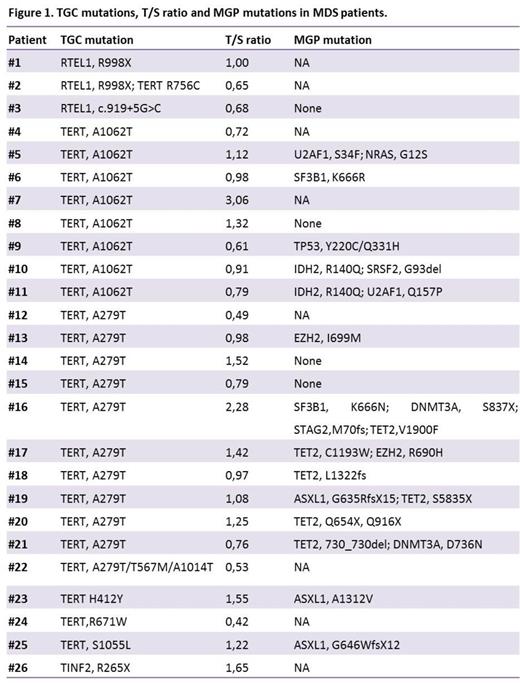Abstract
Telomerase complex maintains telomeres and protects genomic DNA from degradation during cell divisions. Abnormal telomerase function can result in chromosomal instability predisposing to malignant transformation. Short telomere is a typical feature of inherited bone marrow failures syndromes (BMFs), especially dyskeratosis congenital (DC), caused by mutations in genes encoding components of the telomerase gene complex (TGC), shelterin proteins and DNA helicases. Telomere attrition have been associated with leukemic transformation in myelodysplastic syndromes (MDS), as well as complex cytogenetic aberrations, and also with the development of secondary MDS and acute leukemia (AML) after chemotherapy. However, the incidence of TGC mutations in de novo MDS remains largely unknown. Recurrent somatic mutations in genes involving epigenetic, spliceosome, cell signaling and proliferation pathways are common in MDS and have prognostic significance. Identifying specific associations between mutational patterns helps characterize disease biology and thereby improve the therapeutic strategies
To determine the incidence of TGC mutations and study theassociation of TGC mutation patterns with recurrently mutated genes in MDS. To correlate TGC mutations with telomere length, clinical phenotypes and outcome of patients.
We undertook a massively parallel targeted sequencing of all 10 TGC, (TERT, TERC, TINF2, NHP2, NOP10, RTEL1, CTC1, DKC1, USB1 and WRAP53) in a cohort of 174 MDS patients. Furthermore, we measured the telomere length (T/S ratio) by a multiple quantitative real-time PCR in bone marrow mononuclear cells. Additionally, in 151/174 MDS patients, we studied 22 recurrently mutated MDS-associated genes (MGP) by targeted sequencing.
Among the whole cohort, 61% were male. The median age of patients was 63 years (range 17–87). WHO subtypes were 45 RA/RARS/isolated de5q (26%); 50 RCMD/RCMD-RS, (29%); 41 RAEB 1/2, (24%); 8 AML secondary to MDS, (5%); 8 (5%) MDS/MPD and 3 CMML (2%). IPSS cytogenetic risk groups were: 108 patients with good risk (62%), 21 intermediate (12%) and 32 poor risk, (18%) and cytogenetics failed in 10 patients (6%). IPSS categories were low risk 41(24%), intermediate-1: 54 (31%), intermediate-2: 30 (17%), high risk: 13 (7%) and 10 (6%) patients were not evaluated (proliferative CMML and MPD/MDS). Transfusion dependency was present in 80 patients (46%).
Twenty nine TGC mutations were present in 26 patients (15%)(figure 1). Twenty-three patients (88%) had TERT mutations, 3 RTEL1 mutations (13%) and 1 TINF2 mutations (4%) with variant allelic frequency around 50%. Two patients presented more than one mutation in TGC genes. Most of mutations in TGC genes were previously described as germ line variants inpatients with DC and inherited aplastic anemia. All mutations found in TERT gene were missense. In patients with TGC mutations, the median T/S ratio was 1.1 (range 0.4–3.5), shorter than the T/S ratio of age-matched controls, although no statistically significant difference was seen in T/S ratio when compared to wild type. (P=0.527). TGC variations did not correlate with clinical features such as age, cytogenetic risk or IPSS, and had no impact on the overall survival (P=0.659).
In 151 MDS patients, 73% (n=110) had at least one known somatic mutation in the MGP (21% TET2, 15% ASXL1, 14% TP53, 11% DNMT3A, 11% U2AF1, 9% IDH2, 9% SRSF2, 6% EZH2, 4% NRAS, 4% CEBPA, 3% SF3B1, 3% RUNX1, 2% JAK2, 2% FLT3, 1% cCBL). Among the MGP mutated patients, 13% carried also TGC mutations concurrently (Table 1). Chromatin remodeling gene mutationswere less frequent in patients with TGC mutations (P=0,001) as compared to patient with wild type TGC.
We show TGC mutations are frequent in MDS patients (15%). The presence of known TERT variants seen in our cohort demonstrates a clear pathogenic association between MDS phenotype and telomerase mutations, rather than these being bystander variants. Although the heterozygous nature of these abnormalities indicates an inherited variant, the absence of telomere shortening argues against this concept and needs further evaluation. Chromatin remodeling gene mutations are less frequent in patients with TGC mutations. These findings suggest that defective telomere maintenance through TGC mutations might play an important etiological role in the multistep process in pathogenesis of a subset of MDS.
Mufti:Onconova Therapeutics, Inc: Research Funding.
Author notes
Asterisk with author names denotes non-ASH members.


